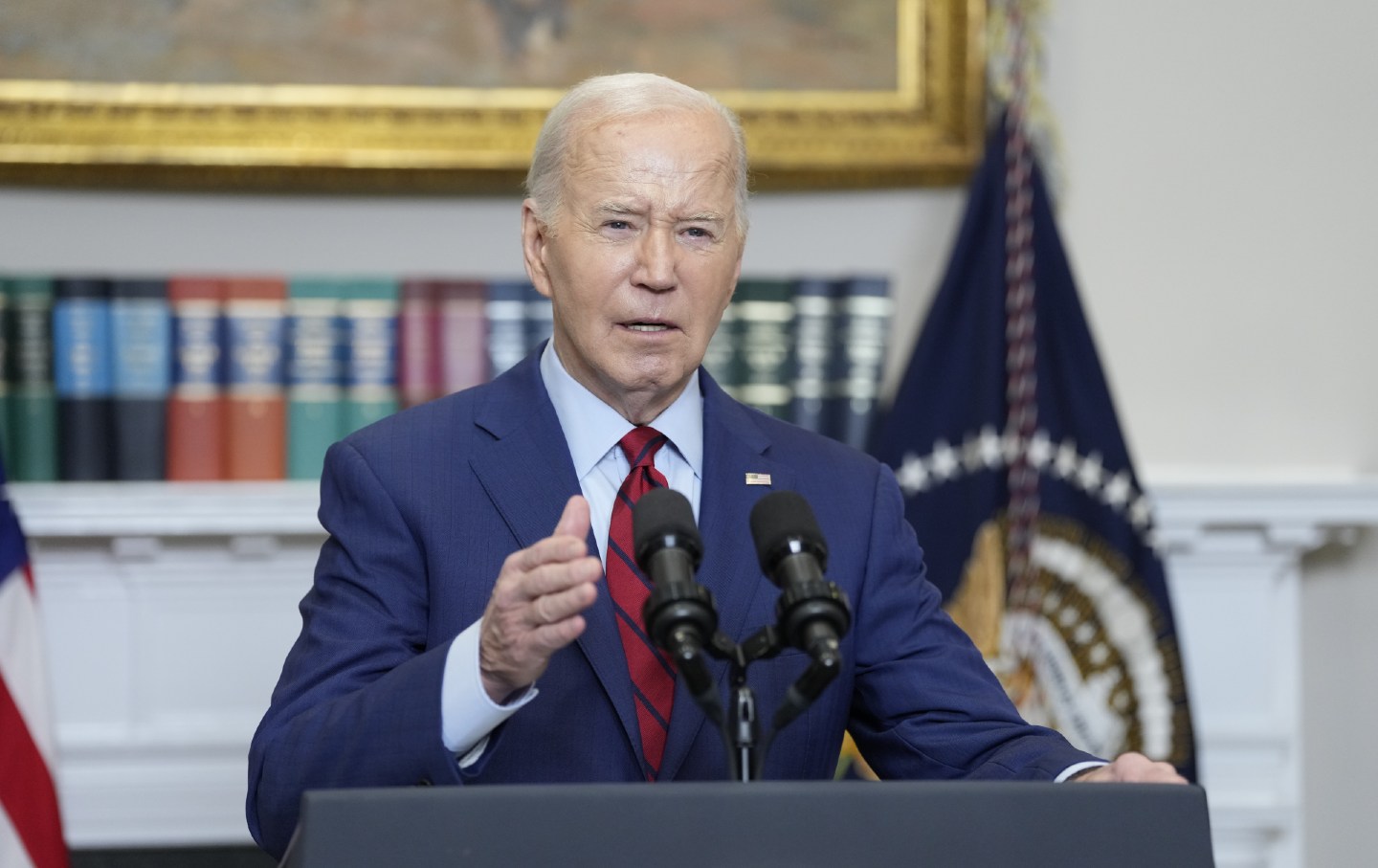Biden’s Domestic Reforms Don’t Add Up to the Great Society
But they do signal that government can make life tangibly better.

You may have felt a sense of déjà vu when Elise Stefanik, the House’s fourth-ranking Republican, recently declared: “There can be no negotiations with self-proclaimed Hamas terrorists and their sympathizers.” Her words echoed George W. Bush’s dictum during the Second Intifada that “no nation can negotiate with terrorists.” Except the “terrorists” to which Stefanik referred are 18-year-old college students protesting the murder of aid workers and the starvation of children in Gaza.
This rhetorical drift demonstrates how desperately Republicans have turned gotcha melodrama into a campaign strategy. First, they forced Columbia University’s president to testify before a performative hearing. Next, in a form of political entrapment, that testimony helped spark student protests, which GOP politicos have since blamed, ever so predictably, on President Biden. Now, they’re passing dangerous, virtue-signaling legislation—like a so-called antisemitism awareness bill that would, in effect, enable the government to rescind federal funding from universities that permit student criticism of Israel—all so they can squeeze out a few histrionic attack ads.
This right-wing fearmongering about peaceful protests at home has, of course, served as a distraction from the actual atrocities happening abroad. And it’s also happened to overshadow several major domestic achievements that the Biden administration has rolled out in recent weeks.
While Congress has debated cynical messaging bills, President Biden has used executive authority to implement a flurry of practical, progressive policies. Though these reforms have ended up below the fold, they’re exactly the kind of measures necessary to protect working people from the corporate greed supported by faux-populist Republicans—and if given more attention, might help them reimagine what Washington can do for them.
The latest string of wins began on April 23, when the Federal Trade Commission announced that it would ban non-compete agreements. In a nation that prides itself on devotion to economic competition, these clauses have prevented 30 million employees from seeking better jobs. And yet administrations of both parties had failed to outlaw them until now.
On the same day, the Department of Labor increased the salary threshold for workers to receive overtime pay, effectively giving a raise to 4 million Americans. The DOL has also issued a rule that protects the wages, jobs, and self-advocacy of farmworkers nationwide. These advances serve as a reminder that Joe from Scranton has been a good, albeit imperfect, friend of labor, and certainly better than the guy who opposed any uptick in the federal minimum wage and failed to pay his own driver thousands of hours in overtime.
Even some of the private sector’s subtler attempts at exploitation have been sniffed out and stopped by the Biden administration in the last couple of weeks. One day after the FTC and DOL announcements, Secretary of Transportation Pete Buttigieg eliminated hidden airline fees and now requires airlines to promptly pay out refunds after flight cancellations. This brings America one step closer to the sort of consumer travel protections enjoyed in Europe—and signals to corporations that if they don’t adopt fair, friendly policies on their own, this administration will step in.
Most recently, on climate change, the issue that will determine the course of the global economy for centuries, Biden has restored regulations ripped apart by the previous administration. The National Environmental Policy Act (which was gutted by Trump in 2020) has been fully restored and expanded by President Biden. The law empowers communities to reject fossil fuel projects that would pollute their homes and make them sick.
These reforms don’t necessarily add up to a second coming of the Great Society. But they do put money back into the American people’s pockets, protect them from corporate interests, and signal that if the American people elect the right leaders, their government can make life tangibly better.
But at the same time, if President Biden wants to get voters—particularly young voters—to care about impactful incrementalism in domestic policy, he will have to get out of his own way and shift course when it comes to foreign policy.
This latest wave of campus protests and Netanyahu’s brutal intransigence have represented an opportunity for the Biden administration to reset its approach to the cataclysm in Gaza. Thus far, they’ve yet to take it. Barely a quarter of all voters endorse his leadership on the conflict. And since the fall, his polling among Americans under 34 has dropped by 16 points. Yet his response to a bad-faith effort from the right to discredit those young people has been to take the bait and issue equivocating statements that satisfy no one.
No matter how many more strategically timed domestic policy wins he notches this year, the president could well lose a narrow election on this issue alone. If he wants to reassert control over his own foreign policy—and lift up his domestic achievements—the answer now is the same that it has been for months: using the power of US arms assistance to condition Israeli war policy, calling for a lasting cease-fire, and using every tool at this country’s disposal to secure one.
Popular
“swipe left below to view more authors”Swipe →This outcome would not just be critical from a humanitarian and geopolitical perspective, but also essential to heal the divisions widening daily across the country.
Even as school lets out this month, student activists are showing no signs of backing down from this fight. A Harvard survey found that a strong majority of young Americans support a permanent ceasefire—and that same group supports Biden over Trump by a narrower margin than ever.
Without real change, we could experience an even more troubling case of déjà vu: a chaotic and pitched Democratic National Convention in Chicago, portending a grim November.
Hold the powerful to account by supporting The Nation
The chaos and cruelty of the Trump administration reaches new lows each week.
Trump’s catastrophic “Liberation Day” has wreaked havoc on the world economy and set up yet another constitutional crisis at home. Plainclothes officers continue to abduct university students off the streets. So-called “enemy aliens” are flown abroad to a mega prison against the orders of the courts. And Signalgate promises to be the first of many incompetence scandals that expose the brutal violence at the core of the American empire.
At a time when elite universities, powerful law firms, and influential media outlets are capitulating to Trump’s intimidation, The Nation is more determined than ever before to hold the powerful to account.
In just the last month, we’ve published reporting on how Trump outsources his mass deportation agenda to other countries, exposed the administration’s appeal to obscure laws to carry out its repressive agenda, and amplified the voices of brave student activists targeted by universities.
We also continue to tell the stories of those who fight back against Trump and Musk, whether on the streets in growing protest movements, in town halls across the country, or in critical state elections—like Wisconsin’s recent state Supreme Court race—that provide a model for resisting Trumpism and prove that Musk can’t buy our democracy.
This is the journalism that matters in 2025. But we can’t do this without you. As a reader-supported publication, we rely on the support of generous donors. Please, help make our essential independent journalism possible with a donation today.
In solidarity,
The Editors
The Nation








